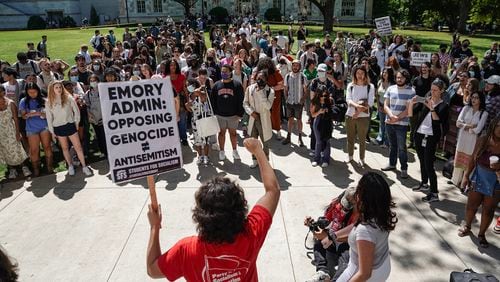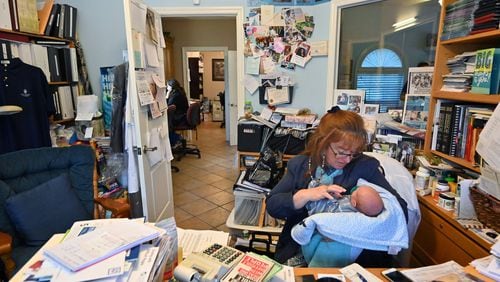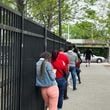I had an incredibly sad conversation with a friend this week. Her child is a junior in high school and hoping to go to college after that. But after assuming she’d always go to school in the Northeast where she grew up, her daughter suddenly she feels lost. As a Jewish student leaving home for the first time, where in America, she wondered, will she feel safe?
What a question to have to ask in 2024.
Protests on college campuses are part of the American tradition. The right to speak out and speak freely has changed the course of history and can be the best of what an exchange of ideas should look like. But in too many instances recently, demonstrations to protest the war in Gaza have crossed the line to threatening and intimidating Jewish students in a way that is anything but American.
Would New York, my friend’s hometown, feel safe for her daughter to go away to college after seeing the anti-Israel protests erupt at Columbia University? Not after a rabbi associated with Columbia instructed Jewish students to “return home and stay there” since it was clear the university could not guarantee their safety.
What about Boston, where Jewish students on Harvard University’s campus said they’ve been threatened and harassed by protesters there? Also unlikely, especially since a group of students there filed a lawsuit against the university for letting it “become a bastion of rampant anti-Jewish hatred and harassment.”
How about a California school? That’s as far away from Boston and New York as a person can get. But on Thursday, the University of Southern California announced it had canceled its main campus graduation because of security concerns. Pro-Palestinian protests there have led to violence and now, fear for visitors’ safety. USC isn’t far from Columbia and Harvard in that way. They may as well be next-door neighbors.
Maybe Emory here in Atlanta? Until Thursday, Emory had been a uniquely quiet campus, with a large and largely secure Jewish student population.
One exception came during Rosalynn Carter’s funeral last fall when masked anti-Israeli and anti-Atlanta Public Safety Training Center activists gathered on the route of the first lady’s funeral procession through campus and yelled “Genocide!” as her hearse drove past.
“Do you think they even know?” an older woman asked me about the protesters. She meant, did they understand the role that President Jimmy Carter had played in trying to forge Middle East peace during his presidency? Or that Carter had been one of the earliest and most prominent American leaders to say that the Palestinian people were being subjected to apartheid in Gaza? The protesters didn’t know or particularly care what Carter had done. They had a point to make.
A block from that protest came another Thursday, larger and exponentially more disruptive, as activists set up tents in the middle of the campus quadrangle. Some of the protesters were not Emory students, but, again, local activists protesting against the Atlanta Public Safety Training Center.
When university officials called police to clear the area this week, protesters and law enforcement officers clashed. Some campus buildings went into lockdown, all while most Emory students were trying to finish the last of their on-campus classes and prepare for final exams.
And speaking of classes, there won’t be any more at Columbia this year, since the administration announced this week that all classes will be hybrid or fully remote, “technology permitting,” for the rest of the semester, because of concerns for students’ safety there.
Allowing one group of protesters to impact the studies and, at USC the graduation, of an entire campus would already seem unfair, but it is doubly so considering these are the same students who had their high school years and graduations disrupted by COVID, too.
The sad irony of the staged encampments and lists of demands from protesters is that the students affected, whether they’re Jewish, Muslim, Christian or nonreligious, have no role in giving the protesters what they say they want.
A petition being circulated at the University of Georgia demands that the university end its study abroad program in Israel and disclose any financial ties to companies with investments in Israel, which the petition repeatedly refers to in quotations as “Israel” and “the Zionist project.” Signs from protests across the country call for an end to U.S. aid for Israel or a withdrawal of Israeli troops from Gaza.
Whether any of that happens won’t be the decision of seniors who may not have a graduation or others who have to walk past shouting activists on their way to final exams. Where’s the victory in that?
The truth is that college campuses are the exact place where progress and understanding are supposed to happen and could happen now. But it should come through scholarship and dialogue and open debate, not with a list of demands issued from a tent city on the quad, and not at the expense of the academic needs of every other student.
And it should never result in one group of students fearing for their safety because they are Jewish. That’s antisemitism, by any definition.
Of all places in America, Atlanta is proof that peaceful, nonviolent protest can yield meaningful progress. Our city, even with its shortcomings, is the embodiment of that progress. The city can be that example now if leaders of good character and intention step forward.
I hope that Atlanta can be the place where my friend’s daughter could feel safe. It’s all any of us want for our children.








